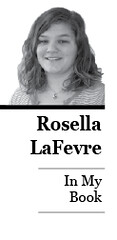Columnist Rosella LaFevre explores ideas of self discovery in Anna Fields’ book “Confessions of a Rebel Debutante.”
The summer before high school, I had to read three books, one of which was Louisa May Alcott’s “Little Women.” It became one of my favorites, not only because it had been the longest book I had read at the time, but because I felt a connection to the character Jo March.
Since that summer, my favorite books have tended to be the ones with characters I could relate to, especially books about female characters who are as strong-willed and rebellious as March was. 
Recently, I had the pleasure to read Anna Fields’ “Confessions of a Rebel Debutante,” which will appear in paperback this February. Fields’ memoir is about a chubby-white kid with dreams of being Scarlett O’Hara who grew into a full-fledged rebel debutante living among Yankees.
For Fields’ sophomore year of high school, she transferred from public school to a single-sex boarding school called Wellingham – a place of tradition where girls had various lessons on ladylike behavior and tradition rules.
The high school I attended, Philadelphia High School for Girls, is the only single-sex public school in Philadelphia. I chose it because it was a place where tradition ruled. Like Fields, I believed I could learn better without boys to distract me.
I was mostly right.
I hadn’t counted on not fitting in even though I never did with my peers in elementary school or middle school. Through much of the memoir, Fields has trouble finding acceptance, whether she’s at home, at boarding school, at Brown University or at New York University.
Even when my peers seemed to welcome me, something felt off. Sure, I enjoyed girl talk and the usual frivolous matters, but not as much as everyone around me. Like Fields, I felt something greater was around the bend, although for me, it wasn’t the promise of a debutante ball.
Feeling somewhat cast out, I poured my time into writing. After reading the “Gossip Girl,” “A-List” and “Clique” series, I was so captivated by this world of riches where even the prodigy of wealthy people could feel tangential. So in the span of about four months, I wrote a 210-page manuscript about rich teenagers in New York City.
For once I felt fulfilled and my writing brought me closer to my classmates who liked to read my short chapters (most of which ended in cliffhangers) during world history and biology classes.
Fields never really bonded with the majority of her classmates, and in fact, her friendship with her roommate Alma served to further alienate her from the rest of the girls.
While she started to act out with Alma and stopped going to cotillion classes and such, I continued trying to make friends at school. By junior year I finally seemed to have a really good group of girls.
It all changed the summer before senior year. My best friend decided to spend the summer partying and we were never able to make time for one another.
Senior year rolled around and I found out I had no classes with any of my closest friends. This meant the death of my social life and my return to writing novels but with a renewed fervor and my true education in independence.
Fields’ heart-warming and entertaining memoir chronicles these adventures including losing her best friend in a car accident, working odd jobs in Los Angeles and studying toward an M.F.A in dramatic writing at NYU.
But out of anything, readers should close their book imparting her greatest lesson: It’s important to remember your roots are part of who you are.
This, too, is the conclusion I’ve come to. As hard as my high school days seemed at the time (and some of them still feel like the hardest days of my life), as lonely as I felt at times and as much as I just wanted to move on to the next chapter of my life, those four years at Girls’ High made me the strong-willed, independent woman I am today.
Rosella LaFevre can be reached at rosella.lafevre@temple.edu.


Be the first to comment